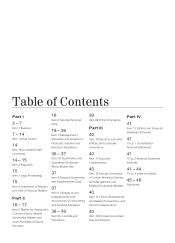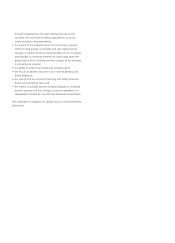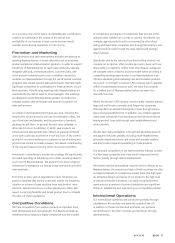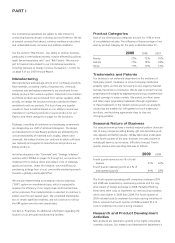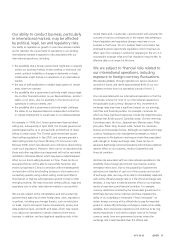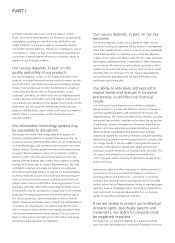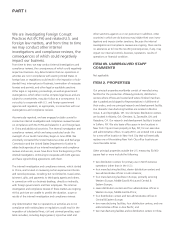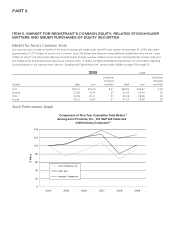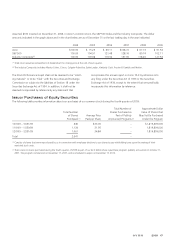Avon 2009 Annual Report Download - page 27
Download and view the complete annual report
Please find page 27 of the 2009 Avon annual report below. You can navigate through the pages in the report by either clicking on the pages listed below, or by using the keyword search tool below to find specific information within the annual report.Our ability to conduct business, particularly
in international markets, may be affected
by political, legal, tax and regulatory risks.
Our ability to capitalize on growth in new international markets
and to maintain the current level of operations in our existing
international markets is exposed to risks associated with our
international operations, including:
•the possibility that aforeign government might ban or severely
restrict our business method of direct selling, or that local civil
unrest, political instability or changes in diplomatic or trade
relationships might disrupt our operations in an international
market;
•the lack of well-established or reliable legal systems in certain
areas where we operate;
•the possibility that agovernment authority might impose legal,
tax or other financial burdens on our Representatives, as direct
sellers, or on Avon, due, for example, to the structure of our
operations in various markets; and
•the possibility that agovernment authority might challenge
the status of our Representatives as independent contractors
or impose employment or social taxes on our Representatives.
For example, in 1998, the Chinese government banned direct
selling but, subsequently in April 2005, the Chinese government
granted approval for us to proceed with alimited test of direct
selling in certain areas. The Chinese government later issued
direct-selling regulations in late 2005, and we were granted a
direct-selling license by China’s Ministry of Commerce in late
February 2006, which has allowed us to commence direct selling
under such regulations. However, there can be no assurance that
these and other regulations and approvals will not be rescinded,
restricted or otherwise altered, which may have amaterial adverse
effect on our direct-selling business in China. There can be no
assurance that we will be able to successfully transition and
evolve our business in China in connection with thedevelopment
and evolution of the direct-selling business in that market and
successfully operate using adirect-selling model permitted in
that market, or that we will experience growth in that or other
emerging markets. We may encounter similar political, legal and
regulatory risks in other international markets in our portfolio.
We are also subject to the interpretation and enforcement by
governmental agencies of other foreign laws, rules, regulations
or policies, including any changes thereto, such as restrictions
on trade, import and export license requirements, privacy and
data protection laws, and tariffs and taxes, which may require
us to adjust our operations in certain markets where we do
business. In addition, we face legal and regulatory risks in the
United States and, in particular, cannot predict with certainty the
outcome of various contingencies or the impact that pending or
future legislative and regulatory changes may have on our
business in the future. The U.S. Federal Trade Commission has
proposed business opportunity regulations which may have an
effect upon the Company’s method of operating in the U.S. It is
not possible to gauge what any final regulation may provide, its
effective date or its impact at this time.
We are subject to financial risks related to
our international operations, including
exposure to foreign currency fluctuations.
We operate globally, through operations in various locations
around the world, and derive approximately 80% of our con-
solidated revenue from our operations outside of the U.S.
One risk associated with our international operations is that the
functional currency for most of our international operations is
the applicable local currency. Because of this, movements in
exchange rates may have asignificant impact on our earnings,
cash flow and financial position. For example, currencies for
which we have significant exposures include the Argentine peso,
Brazilian real, British pound, Canadian dollar, Chinese renminbi,
Colombian peso, the Euro, Japanese yen, Mexican peso, Philip-
pine peso, Polish zloty, Russian ruble, Turkish lira, Ukrainian
hryvnia and Venezuelan bolivar. Although we implement foreign
currency hedging and risk management strategies to reduce
our exposure to fluctuations in earnings and cash flows associated
with changes in foreign exchange rates, there can be no
assurance that foreign currency fluctuations will not have amaterial
adverse effect on our business, results of operations and
financial condition.
Another risk associated with our international operations is the
possibility that aforeign government may impose currency
remittance restrictions. Due to the possibility of government
restrictions on transfers of cash out of the country and control
of exchange rates, we may not be able to immediately repatriate
cash at the official exchange rate or if the official exchange rate
devalues, it may have amaterial adverse effect on our business,
results of operations and financial condition. For example,
currency restrictions enacted by the Venezuelan government in
2003 have become more restrictive and have impacted the
ability of our subsidiary in Venezuela (“Avon Venezuela”) to
obtain foreign currency at the official rate to pay for imported
products. Unless official foreign exchange is made more readily
available, Avon Venezuela’s operations will continue to be neg-
atively impacted as it will need to obtain more of its foreign
currency needs from non-government sources where the
exchange rate is less favorable than the official rate.
AVON2009 9


